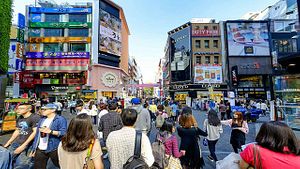In late August, South Korea held its 404th civil defense drill with sirens sounding at 2 p.m. across the peninsula and government officials in yellow jackets encouraging citizens to enter bomb shelters in subway stations and public buildings. At the boarding school where I teach, I stood sternly in front of a class of 37 students as a mock public announcement blared over the intercom, directing citizens to underground shelters, drivers to pull over and business-people to shelter in their workplaces.
Most students chuckled, oohed and aahed at dramatized details, and just enjoyed the disruption of class. I glared, hands on the lectern, elbows out. But when one boy perfectly mimicked the official in the announcement, I laughed along with everyone else, my icy act shattered.
A few weeks earlier, I had been in the middle of my summer vacation, sitting along the shores of a New Hampshire lake, when news came of North Korea’s successful ICBM launch. Evening news broadcasts speculated about preemptive U.S. strikes and a second Korean War. Family and friends wondered what I thought about the “crazy man” in the North. Some opined about the madman in Washington, D.C. I told them that one leader was following an old family playbook. The other seemingly had no plan.
Then came the August 8 Washington Post report that North Korea had “successfully produced a miniaturized nuclear warhead,” presumably to be mounted on one of those ICBMs. The next day, U.S. President Donald Trump made his “fire and fury” remarks, prompting a fresh firestorm of frightening headlines and chyrons. Not one to be outdone at his own game, Kim Jong-un revealed a plan in the works to land missiles in waters around Guam. One night soon after, my mother yelled from the porch that the U.S. had “just flown” B-1B bombers over North Korea. Knowing Fox News was on inside, I told her that was impossible as the story would’ve been about those bombers being shot down.
But sarcasm and calls for calm consideration did not stall the more serious inquiries about my return to Korea. “It’s too dangerous to go back now,” my mother declared, advising that I have my things boxed up and sent back. “Good time to wrap it up,” a best friend said one night next to a campfire. And my father, the most sensible man I know, called from his Virginia home one day to get a load off his chest: “I wouldn’t forgive myself if I didn’t tell you to go over there, pack your stuff and turn around.”
No one cared much when I detailed 2010, the year North Korea sank a South Korean naval corvette, the Cheonan, killing 48 sailors, and, months later, bombed the South Korean island of Yeonpyeong in the Yellow Sea, one of the worst land attacks since the Korean War. Before that, numerous naval battles had taken place in the same territory along the Northern Limit Line in the Yellow Sea, a territorial marker North Korea disputes.
No war broke out. I survived. People on the front lines — military commanders and aging diplomats — knew the stakes with millions of people in bustling Seoul, 35 miles south of the 38th parallel. And North Korea has a plan, not a death wish.
It even proved of little use to recount details of the 1976 axe murder incident along the Demilitarized Zone, when North Korean soldiers attacked U.S. soldiers trimming a poplar tree, killing two U.S. Army officers. Regardless, nearly everyone believed I was headed back to a soon-to-be war-zone.
Meanwhile, friends, colleagues and students in Korea painted a different picture. Sweltering summer continued. Beaches and valleys swarmed with the annual throngs of vacationers. The stock market continued its surge. Students slaved away in SAT institutes. A colleague emailed about early requests for the semester’s syllabus. A message came about an upgrade to even faster internet in my apartment. I wondered about my refrigerator and air conditioner more than the nearest bomb shelter.
So I stuffed my backpack, said my most calming goodbyes and flew the 7,000 miles from Boston to Incheon. On my first night back, the news led with a nationwide ban on egg sales due to pesticide contamination. A story about the corruption trial of Lee Jae-yong, Samsung’s de facto leader, followed. The forecast called for rain. Nothing about war.
Back at school, the halls buzzed with returning students and colleagues shared vacation stories, while the trees around campus reverberated with cicada calls. Even the North’s launch of a missile over Japan went unmentioned. North Korea seemed farther away than that New Hampshire lake.
Then, less than a week later, on a slow Sunday afternoon, news came of North Korea’s sixth nuclear test. I had been hiking with friends at the time but no seismological tremors shook the trail. The evening news led with the details and the usual pictures of a serious or celebratory Kim Jong-un, mushroom clouds and missiles. Experts opined about the implications: China would tacitly fume; Japan would militarize; Trump would… well, no one really knew.
At school on Monday morning, staff and students busied themselves with the week ahead. Yearly class trips would begin on Wednesday. Seniors had a mock CSAT scheduled. I had college recommendation letters to consider. Yet, for the first time, I looked around my office and wondered what I’d do if war broke out — who I’d call, what I’d pack, where I’d go, and how I’d get there. I thought of that New Hampshire lake thousands of miles away. But, a few minutes later, as usual, the bell rang at 9 a.m. sharp, and everyone had a class to get to.
John M. Rodgers has lived in South Korea for more than a decade, where he’s worked as an English teacher and freelance journalist.

































